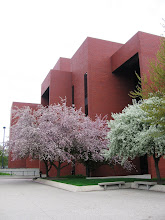Providing Customer Service at the Ball State University Libraries

Good customer service is a cornerstone of any successful enterprise. This tenet is repeatedly cited in business surveys, commercial workshops, and management texts. In addition to expert opinions, personal experience tells us that positive customer experiences contribute to creating a satisfied and loyal clientele.
The University Libraries’ mission to support the teaching, learning, and research needs of the Ball State academic community are well-served through the application of basic customer-service principles, including:
· Caring about customers and their needs. The University Libraries’ staff focuses on providing individual service. When speaking to library personnel about their career choices, invariably their responses include something akin to “I find great satisfaction in helping people.”
· Knowing what the Libraries have to offer. Information professionals devote significant amounts of time to learning about new resources and research tools so they can make the best matches to meet user needs. Library staff are also well-versed in building layouts, operational procedures, equipment use, and other useful information.
· Providing quick and reliable service. Experienced staff are a key component to providing timely and knowledgeable responses. So, too, are a variety of access methods such as multiple service counters, phones, e-mail, and live chat connections.
· Maintaining convenient service hours. Bracken Library is open 120.5 hours weekly, (until 3 a.m. five days a week, Sunday through Thursday), which includes staffing of Bracken’s major service points and providing librarians who are able to assist students and faculty with informational needs early in the morning, late at night, on weekends, and during holidays.
· Caring about customers and their needs. The University Libraries’ staff focuses on providing individual service. When speaking to library personnel about their career choices, invariably their responses include something akin to “I find great satisfaction in helping people.”
· Knowing what the Libraries have to offer. Information professionals devote significant amounts of time to learning about new resources and research tools so they can make the best matches to meet user needs. Library staff are also well-versed in building layouts, operational procedures, equipment use, and other useful information.
· Providing quick and reliable service. Experienced staff are a key component to providing timely and knowledgeable responses. So, too, are a variety of access methods such as multiple service counters, phones, e-mail, and live chat connections.
· Maintaining convenient service hours. Bracken Library is open 120.5 hours weekly, (until 3 a.m. five days a week, Sunday through Thursday), which includes staffing of Bracken’s major service points and providing librarians who are able to assist students and faculty with informational needs early in the morning, late at night, on weekends, and during holidays.
Good customer service does not happen by chance. It stems from a commitment to quality by the University Libraries’ personnel that includes seeking and hiring staff who have a positive service orientation, building customer service elements into training programs for new employees, providing workshops to keep staff apprised of new resources and technological advances, and using task teams and working committees, such as the Services Excellence Working Group, to encourage development of service skills.
The results take a variety of forms. In the University Libraries, quality service can be most broadly interpreted as efficiently providing excellent resources in a comfortable setting to those who need them for research, learning, and discovery. More specific examples include library instruction sessions tailored to meet class needs, one-on-one research consultations, providing reliable technology such as computers and software for all library users, and more.
Little things count, too. For example, a staff member who responds to a phone call from a library user by going to another floor in the library to retrieve a flash drive left in a computer, or an evening staff member who takes time to help a frustrated student decipher a video formatting problem for a presentation due the next morning, or a librarian who forwards information from a new Web site to a faculty member who has ongoing research interest in that area.
Far from random acts of kindness, these are the sorts of daily activities that combine to create both user satisfaction for those who visit the University Libraries for their research and learning and job satisfaction for those professionals and paraprofessionals who work in the University Libraries.


0 Comments:
Post a Comment
<< Home